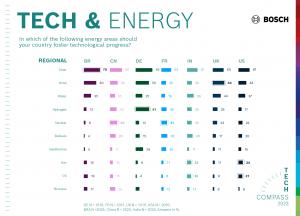Technology will play the key role in combating climate change, say 84% of UK respondents - Bosch Tech Compass 2023
Bosch’s 2023 Tech Compass report highlights attitudes of people towards technology, and public perceptions on climate technology, sustainability, and energy.
DENHAM, UK, January 5, 2023 /EINPresswire.com/ -- 84% of UK respondents in Bosch’s Tech Compass 2023 report believe that technology will play the key role in combating climate change, an increase of 10% compared to the 2022 report. However, despite the rising attention around the climate crisis, nearly two thirds (64%) of people in the UK feel that businesses are not serious enough about sustainability, and neither do 58% of people globally.The global research report covers the attitudes of people towards technology, and highlights public perceptions on climate technology, sustainability, and energy.
Companies can do more when it comes to sustainability -
While the report highlights concerns about how seriously businesses take sustainability, 80% of the respondents also recognise that focusing on sustainability brings companies economic success.
Vonjy Rajakoba, Managing Director, Bosch UK comments: “We welcome the increasing expectation that technology should play a crucial role in combating climate change. We acknowledge that more should be done, and it’s also important that businesses communicate more about what they genuinely put in place. We have been investing heavily in green technologies that reduce energy consumption, conserve resources, and help to protect the environment. In fact, green tech for industry generated sales of over 800 million euros for Bosch in 20211, so it is a substantial area for us that is only growing in importance.”
Public perceptions of tech progress and competition -
76% of UK respondents (and 75% of people globally) recognise the positive impact of tech, but when it comes to public perception of technological progress and competition, there is a gulf between how respondents view their nations.
In the UK, 74% of people saw the nation as very well or well equipped to deal with accelerating technological change, compared to a global average of 71%. But this compares to very high scores registered in China (96%), India (90%), and the USA (81%). Meanwhile France (61%) and Brazil (53%) scored lower.
Despite recognising its positive impact, only 41% of people in the UK believe tech currently tackles the world’s major problems. This is compared to an average of 52% of respondents globally who believe it does, boosted by perceptions in China (88%) and India (81%).
Vonjy Rajakoba continues: “In the fight against climate change, technology will play a leading role and businesses are waking up to this. The green tech market is growing by 8% annually2, and in 2022, climate tech funding represented more than a quarter of every venture dollar invested, according to PwC’s recent State of Climate Tech report.
“Whilst this is hugely promising, significant investment is needed, and it is clear that the public expectation of companies is that organisations should do more for the environment. Some investments will generate short-term return, others will need a longer time to bear fruit but we’re convinced that it is both responsible and makes business sense to make them.”
Climate engineering and hydrogen top for positive societal contribution -
The UK is one of the most optimistic countries in Europe about its focus on sustainable technologies, with 56% of people agreeing that the UK is in a leading position in the field of sustainable technology. However, respondents in China (79%), India (77%) and USA (66%) ranked their countries significantly higher.
Additionally, UK audiences ranked climate engineering (51%), and hydrogen fuel cells (44%) as the two technologies that will make the greatest positive contribution to society. People in the UK ranked climate engineering more highly than other countries and view hydrogen more positively than many other countries too, alongside German audiences who also rank it highly (45%).
The report also highlighted which energy sources respondents’ think the country should focus on, and the UK public is clearly in favour of low carbon energy at the expense of fossil fuels. Nearly two thirds (64%) of UK respondents said they would like to see wind power as a focus, followed by solar (60%) and water (44%). The UK is least enthusiastic about gas (11%), oil (9%), and biofuels (8%).
When it comes to the most promising technologies of the future, UK audiences ranked climate engineering (39%) and AI (38%) as most important.
Vonjy Rajakoba added: “Technology is all around us and as it develops further businesses must ensure that it is used for the greater good. There’s a growing realisation in the potential of technology to combat climate change and the Tech Compass shows that the public will hold companies to account. They want to see the latest developments used in a way that benefits society and improves quality of life for everyone.”
Jess Schon
Bosch
+44 7540 766829
email us here
Legal Disclaimer:
EIN Presswire provides this news content "as is" without warranty of any kind. We do not accept any responsibility or liability for the accuracy, content, images, videos, licenses, completeness, legality, or reliability of the information contained in this article. If you have any complaints or copyright issues related to this article, kindly contact the author above.


